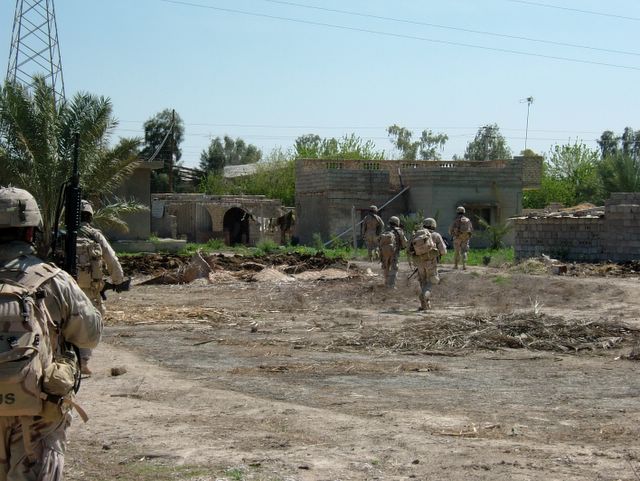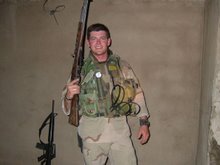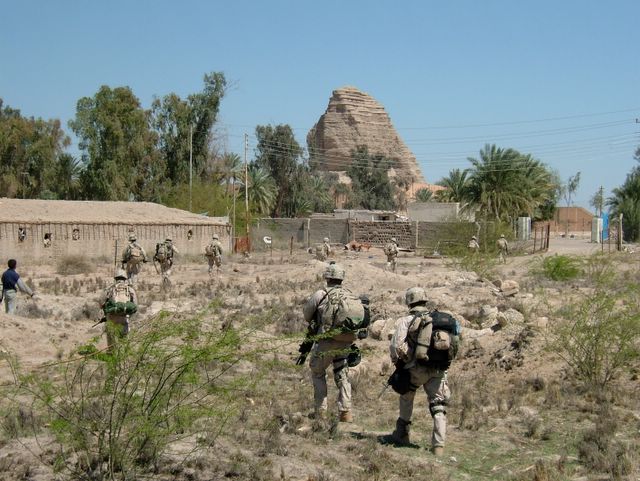Voting Extended in Historic Iraq Elections
Thursday, December 15, 2005
FOX NEWS
FOX News' Dana Lewis and Liza Porteus and The Associated Press contributed to this report.
BAGHDAD, Iraq — The Iraqi election commission extended voting by one more hour because of high turnout in the country's historic parliamentary elections Thursday.
And to the surprise of coalition forces, violence in Iraq was much lighter than expected and the smattering of attacks didn't appear to discourage Iraqis, some of whom turned out wrapped in their country's flag on a bright, sunny day and afterward displayed a purple ink-stained index finger — a mark to guard against multiple voting.
If all goes well, U.S. officials hope the vote will set the stage for a troop reduction in that country.
"We see a set of circumstances with the elections that we can begin to downsize forces and reduce, significantly, the size of our forces in the aftermath of the election," U.S. Ambassador Zalmay Khalilzad told FOX News. "It can be seen as a calendar of events leading to … U.S. withdrawl."
The high voter turnout was due, in part, to large numbers of Sunni Arabs showing up at some of the country's 33,000 polling stations; many Sunnis boycotted elections earlier this year. Many Iraqis had waited until the last minute to vote, to make sure the security situation was under control before they left their homes for the polls.
An imam in Ramadi was heard over a mosque loudspeaker saying: "God will bless you with a great life if you go out and vote. This is your last chance to vote."
Iraqis were voting to establish a permanent democratic government in Iraq; some preliminary returns were expected late Thursday, but final returns could take days, if not weeks. Vote counting could carry on until the end of December or early January.
Iraqis voted in January to elect the current interim government that drafted the Iraqi constitution, which was approved in October. Strong turnout in Sunni Arab areas this time around bolstered hopes of U.S. and Iraqi officials that more Sunni participation and representation in the government could help quash the insurgency; Sunni Arabs make up the backbone of the insurgency in Iraq.
U.S. officials also say the government need to be able to reconcile Iraq's disparate groups. The Americans also want to avoid protracted negotiations to choose a new prime minister and cabinet — a process that dragged on for three months after the last vote.
"The Iraqi people are showing the world that all people — of all backgrounds — want to be able to choose their own leaders and live in freedom. And we're encouraged by what appears to be a large turnout throughout Iraq," said White House spokesman Scott McClellan.
'Our Revenge on Saddam'
Some Iraqis said Thursday's vote was a symbolic gesture of democracy that had been suppressed for years under the brutal rule of Saddam Hussein.
"This is the day to get our revenge on Saddam," said Kurdish voter Chiman Saleh, a Kirkuk housewife who said two of her brothers were killed by the ousted regime. Voter turnout was brisk in the northern cities of Mosul and Kirkuk, especially in Kurdish districts.
Ethnic tensions in Kirkuk, claimed by Arabs, Kurds and Turkomen, could be seen, however. Norjan Adel, a poll watcher for the Turokman Front, complained of irregularities by the Kurds, including multiple voting.
She prevented a Kurdish policeman from entering the station carrying a flag of the self-ruled Kurdish region, saying: "I only recognize the Iraqi flag, and any other flag is a joke."
More than 1,000 Sunni clerics called on their followers to vote, and insurgent groups, including Al Qaeda in Iraq and the Islamic Army in Iraq, pledged not to attack polling stations.
But several explosions rocked Baghdad as the polls opened, including a large one near the heavily fortified Green Zone that slightly injured two civilians and a U.S. Marine, the U.S. military said.
A civilian was killed when a mortar shell exploded near a polling station in the northern city of Tal Afar, and a bomb killed a hospital guard near a voting site in Mosul.
A bomb also exploded in Ramadi, and the U.S. military said one was defused at a polling station in Fallujah. Some election sites in Ramadi were guarded by masked gunmen.
Maj. Gen Rick Lynch, deputy general for the multi-national forces in Iraq, told FOX News that there were only 14 attacks against polling stations, "which is a direct tribute to the capability of the Iraqi security forces … they wanted to make sure their people could vote for a representative government and they did that today."
"This is an amazing day for the people of Iraq," he added.
"It is a good day so far, good for us, good for Iraq," Khalilzad told The Associated Press. "This is a first step for integrating the Sunni Arabs and bringing them into the political process and integrating them into the government."
Up to 15 million Iraqis were electing 275 members of the first full-term parliament since Saddam's ouster from among 7,655 candidates running on 996 tickets, representing Shiite, Sunni, Kurdish, Turkomen and sectarian interests across a wide political spectrum.
Iraqis do not vote for individual candidates, but instead for lists — or tickets — that compete for the seats in each of the 18 provinces.
An alliance of Shiite religious parties, which dominate the current government, was expected to win the largest number of seats — but not enough to form a new administration without a coalition with rival groups. That could set the stage for lengthy and possibly bitter negotiations to produce a government.
The new parliament will serve a four-year term; an interim parliament was voted in Jan. 30, and the constitution was ratified in October. The new parliament will name a government, including a new prime minister.
With a nationwide vehicle ban in effect, most Iraqis walked to the polls. Streets were generally empty of cars, except for police, ambulances and a few others with special permits.
Tens of thousands of Iraqi soldiers and police guarded polling stations, with U.S. and other coalition forces standing by in case of trouble. U.S. troops and bomb-detecting dogs checked thousands of polling stations before handing over control to Iraqi police.
"Sometimes it feels like we're beating a dead horse, but maybe this here today will be the culmination of it all," said Staff Sgt. Jason Scapanski, 33, of St. Cloud, Minn., assigned to the 101st Airborne in Salahuddin province north of Baghdad.
U.S. and coalition officials who are banking on strong voter turnout to elect a legitimate government in the eyes of the many different Iraqi groups who, despite some of their religious differences, have a common goal: To get a representative government up and running as soon as possible so that U.S. troops can go home.
Sunnis Vote En Masse
In Fallujah, the former Sunni insurgent stronghold overrun by U.S. forces in November 2004, hundreds packed a high school polling station, with many saying they saw the vote as a way to not only get rid of the Americans but to also get rid of the Shiite-dominated government.
"It's an extremist government [and] we would like an end to the occupation," said Ahmed Majid, 31. "Really the only true solution is through politics. But there is the occupation and the only way that will end is with weapons."
Even in insurgent bastions such as Ramadi and Haqlaniyah, Sunnis were turning out in large numbers.
"I came here and voted in order to prove that Sunnis are not a minority in this country," said lawyer Yahya Abdul-Jalil in Ramadi. "We lost a lot during the last elections, but this time we will take our normal and key role in leading this country."
Teacher Khalid Fawaz in Fallujah said he also participated "so that the Sunnis are no longer marginalized."
Sunnis have repeatedly complained of abuse at the hands of Shiite-dominated security forces. U.S. and Iraqi forces have come across several apparent victims of torture around Iraq.
The big turnout in Fallujah also caused problems, with voters, election officials and the mayor complaining of a shortage of ballot boxes and ballots.
Mayor Dhari Youssef al-Arsan, who put turnout at about 45 percent, said 11 out of 35 polling stations did not get ballot boxes and some ran out of ballots in the early hours of voting.
"Three sites stopped because they ran out of ballots," he said. "We had an administrative problem opening polling sites in some of the centers."
He said some of the voters told him that "they thought it was done purposely."
Shiites and Kurds seemed more hopeful that the new government would be more successful than the outgoing one in restoring security and providing basic services. Shiites also appeared confident of retaining their leadership role.
The country's leading Shiite cleric, Grand Ayatollah Ali al-Sistani, told Shiites to support candidates who defend their principles — a veiled warning against turning toward secular political movements.
"They are clerics, and clerics do not steal our money," said Abbasiya Ahmad, 80, as she voted for the Shiite religious bloc, the United Iraqi Alliance, at a Baghdad polling station. "We want people who protect our money."
If all goes well, the United States and other coalition partners would like to begin drawing down their troops next year.
Despite the positive signs in Thursday's elections, some Middle East experts warn that the work is not done when all the votes are counted.
"I do think it's a very significant change, I do think it creates the potential to have a great impact," former Mideast Ambassador Dennis Ross told FOX News, referring to Sunni participation in the elections. "But before we rush to make a decision about how soon change will take place and what it's going to look like," he added, it will take awhile to set up the new government and for Sunnis make revisions to the constitution.
Former Coalition Provisional Authority spokesman Dan Senor told FOX News said he believes the new government may be set up sooner than expected, perhaps within a month after the votes are counted.
"I think the administration here, the U.S. administration, is going to be less reticent about putting pressure on the Iraqis to get a government formed quickly," Senor said.
He also said there may be a problem with the new prime minister having enough power to make decisions, given how the Iraqi constitution decentralizes power in the executive branch, which may lead to gridlock among the Shiites, Sunnis and Kurds on some issues.
"I do think in that regard, decision-making is going to be tough for any prime minister, whoever's elected," he said.
President Jalal Talabani, a Kurd, highlighted a key looming fight — possible amendments to the constitution — as he voted in the northern city of Sulaimaniyah.
"I hope that the Iraqi people will stay united. We hope that the people will vote to keep the constitution that was approved by the Iraqi people," he said.















